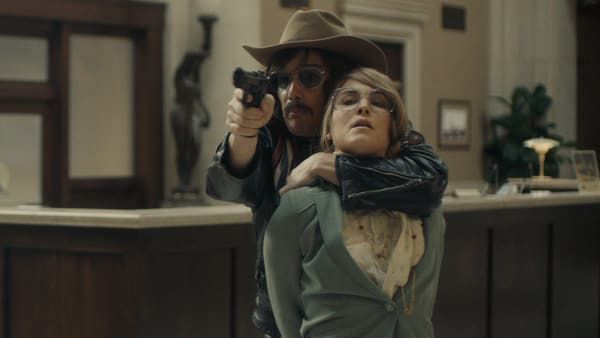Eye For Film >> Movies >> The Captor (2018) Film Review
The Captor
Reviewed by: Jane Fae

According to the opening credits, The Captor is “based on an absurd but true story.” Perhaps. Though the most absurd – questionable, even – aspect of this film is its title, which merely alludes to the actual events at the heart of this story.
As opposed to 'Stockholm', the title used almost everywhere that is not the UK, and which instantly places it.

For this is the story of the origin of the now clichéd 'Stockholm syndrome': a phenomenon according to which the victims of hostage takers gradually assimilate to and then side with their captors.
It first gained notoriety in the wake of the 1973 bank heist played out here, as it became clear, after the event, that several hostages had sided with and aided the robbers in the course of a long drawn out negotiation with authorities; and it likely gained an added boost with the case of Patty Hearst, kidnapped the very next year and so thoroughly converted to the side of her kidnappers, the Symbionese Liberation Army, that she was later convicted of armed robbery on their behalf.
Is it absurd that someone in fear for their life could begin to prefer those they ought to consider enemies, especially where they are caught in close proximity with the latter and their health, their welfare, their very survival depend on them? Especially when the 'good guys', the people tasked with saving them, turn out to combine stupidity and incompetence in equal measure?
No need to learn to love Big Brother: but pause, if you will, to consider how each and every one of us, driven by the necessity of earning a living, spends life in thrall to corporations and bosses we might, if free, dismiss as lunatic or evil.
As for the Captor, it's of interest first because it provides insight into a thing, a phrase, we regularly use without thinking much of its origins. It is in some senses a claustrophobic piece, as befits the situation it focuses on: two robbers, three hostages, for the most part limited to the confines of the bank vault of which they have taken possession and in which they now find themselves trapped.
The films kicks off, with little prelude, with bank robber Kaj Hansson (Ethan Hawke) taking over a major Stockholm bank. After letting most of the hostages depart, he is left with just three, including Bianca Lind (Noomi Rapace) on whom the focus now falls. To this quartet is added Gunnar Sorensson (Mark Strong), a convicted robber whom Kaj is seeking to spring from prison by his actions and who is brought to the bank by police to act as intermediary.
What follows is a nice study in group dynamic as a fivesome, split two/three between captors and hostages, gradually evolves a dynamic and alliances of its own and as the neat boundaries between these categories break down.
Helping the process along is the bumbling and seemingly sociopathic police chief Mattson (Christopher Heyerdahl), Bianca's emotionally illiterate husband Christopher (Thorbjørn Harr) and the obdurate Swedish Prime Minister Olof Palme (Shanti Roney).
Bottom line, with each and every interaction with the outside world, the line between who is making sense, who is trustworthy erodes further. As the hostages come to realise that in order to uphold a point of principle, the outside would rather see them dead than come to any accommodation with those inside, the shift in allegiance becomes not just possible but inevitable.
Still, all credit to director/writer Robert Budreau for the gentle way he takes us by the hand, places us in the room with the hostages and shows, with humour and wit, just why events played out as they did. Since it is made very clear throughout that this film attempts to tell the 'true' story, I would like to think it is an accurate representation. Certainly it has the whiff of verisimilitude about it, though that may just be good filmmaking!
The growing relationship between Bianca and Kaj is played out believably, sweetly, with clear and well-defined inflection points as one by one, illusions about the competence of the authorities are dispelled.
Absurd? Perhaps. Because time after time, as robbers or police or politicians manage to add to the tension of the situation with yet another stupid unforced error, one is left asking: why? Why can't someone in this awful mess act like a grown-up and sort it all out? But if they had, there would be no syndrome, no story, no film.
Reviewed on: 23 Jun 2019
















